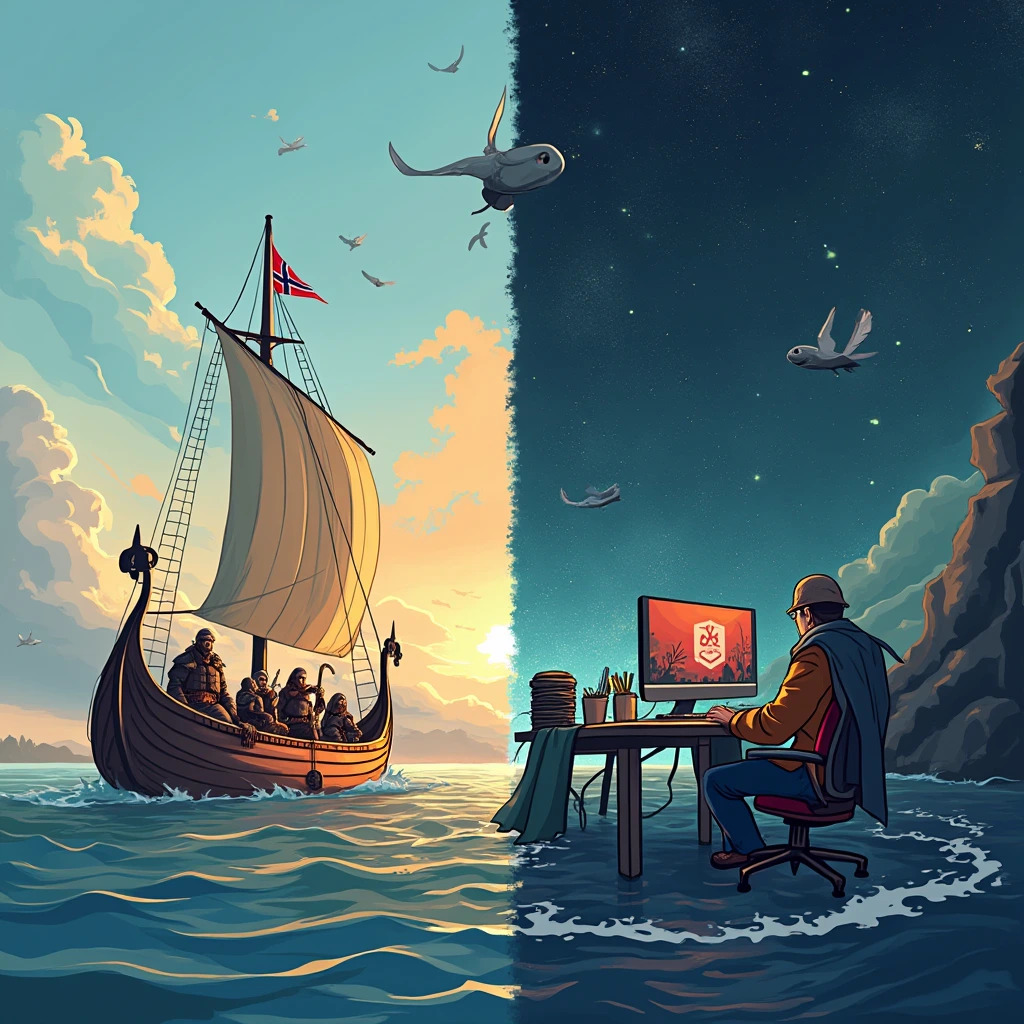How Resilience and Innovation of Vikings Shaped Minecraft, Unity, Klarna, and Spotify
- 1 min read
This blog explores the link between Viking resilience and modern tech giants like Spotify, Minecraft, Unity, and Klarna. It discusses how Viking innovation in exploration and adaptation influenced today's digital revolution, driving advancements in gaming, payment methods, and music streaming.

The journey from the infamous Viking raids of the 8th to 11th centuries to the groundbreaking code wielded by Spotify's developers today is a remarkable tale of transformation. While the Vikings were known for their fierceness and conquests, they were also brilliant navigators, traders, and engineers whose influence reaches further than one might expect. Fast forward a millennium, and we find their descendants among the most innovative minds driving today's digital revolution.
The Viking Spirit: Resilience and Innovation
Vikings weren’t just raiders; they were explorers, driven by curiosity and a need for resources. Their longships, a marvel of engineering, allowed them to sail far beyond their home territories—innovating the art of navigation and boat-building. The Vikings understood the importance of adaptability and resourcefulness, characteristics that are at the core of modern-day innovation.
Just as the Vikings crafted their own future through maritime exploration, today’s tech developers are crafting the future through software innovation. Take Spotify's developers, for example. What started as a small Swedish startup has revolutionized the music industry. Spotify’s success is a testament to the ability to take risks, challenge traditional systems, and think outside the box—traits that have historical roots in Viking culture.
The Technological Bridge: From Longships to Code
Much like the Vikings needed tools to conquer new lands, today’s developers require tools to tackle modern challenges. The bridge between these two eras isn’t just cultural—it's technological. Vikings were the pioneers of their time, much like today’s tech creators. Where they used rudimentary navigational instruments, today's developers rely on sophisticated code editors and collaboration tools. And just like the Viking voyages, they have global reach, connecting cultures, industries, and ecosystems through the power of the internet.
Spotify, for instance, provides access to music from every corner of the world, much like the Vikings once traveled far and wide, bringing back goods and knowledge from other cultures. The ambition to cross boundaries and create something universally impactful is the common thread that connects these two eras.
In addition to Spotify, modern-day tech innovators with Viking heritage have shaped industries in unexpected ways. For example, Markus "Notch" Persson, a Swedish developer, created Minecraft, a game that has captivated millions globally and become a cultural phenomenon. The Unity game development platform, which powers countless indie games and blockbuster titles, was also born from Scandinavian ingenuity, allowing game developers to create worlds of their own. Furthermore, companies like Klarna, founded in Sweden, revolutionized the payment system with their innovative "buy now, pay later" service, changing how consumers make online purchases.
From Raids to Routines: A Modern-Day Viking Work Ethic
Viking raids were often characterized by their strategic planning and teamwork. Similarly, Spotify’s developers thrive on collaboration and agile methodologies. In both cases, success doesn’t come from individual effort but from a collective, coordinated approach to solving complex problems.
The Vikings were masters at adapting to the environments they encountered, just as developers must continuously adapt to the ever-changing tech landscape. By embracing the principles of innovation, teamwork, and resilience, today’s developers continue to push boundaries, just as their Viking ancestors did in the fields of exploration and expansion.
Conclusion: The Legacy of Innovation
The leap from the age of Viking raids to Spotify's revolutionary music platform might seem vast, but the spirit of innovation, exploration, and resilience remains unchanged. Whether navigating treacherous seas or solving complex coding problems, the drive to create, improve, and innovate transcends time.
The journey from "barbarian Vikings to Spotify's developers" is a powerful reminder of how innovation has always been at the heart of progress. The Vikings paved the way for today’s tech developers by setting the foundation for exploration, collaboration, and innovation. And as we look toward the future, we can be sure that the same spirit of adventure that once propelled the Vikings across the seas will continue to propel us forward, creating new worlds and new opportunities through the power of technology. With innovations like Minecraft, Unity, and Klarna, the Viking spirit lives on in the digital age, shaping industries and creating new possibilities.
Sources
How Viking Culture Shapes Modern Society: A Deep Dive
Bluetooth: How Vikings played a role in modern technology
Why Did Spotify, Skype, and Klarna Start in Sweden?
A Brief History of Unity
Klarna's History: A Distruptive Force Coming of Agef

Turkish Tech Renaissance: The Remarkable Growth of the IT Industry
Turkey's IT industry is rapidly growing, driven by its strategic geographic location, a young and educated workforce, and strong government support. The country's thriving startup ecosystem, emphasis on digital transformation, and increasing IT exports are positioning Turkey as a significant player in the global technology landscape. This growth trajectory highlights Turkey's potential and ambition in shaping the future of technology both domestically and internationally.

TURKIYE: The Rising Star of IT Outsourcing
Turkey is quickly becoming a key player in the IT outsourcing industry, thanks to its strategic location, skilled workforce, and cost-effective solutions. Positioned between Europe and Asia, Turkey offers businesses access to top-tier IT talent at competitive prices, with minimal language and cultural barriers. The country's commitment to data protection and innovation further enhances its appeal as a reliable and cutting-edge IT outsourcing partner.